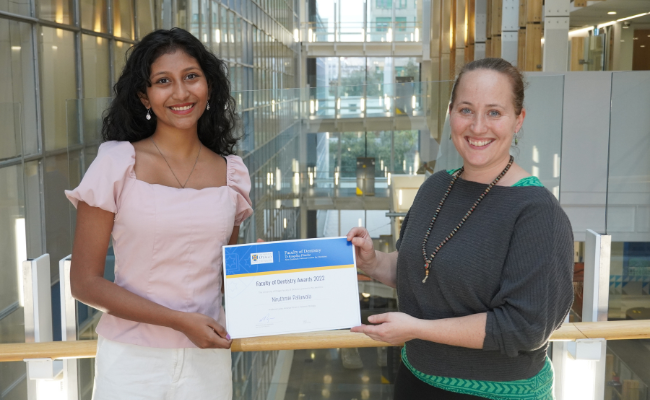
When Professor Jules Kieser passed away in 2014 he left a legacy which would live on for years to come.
Forensic Biology Summer School student Niruthmie Pallawala, who recently received an award established in his honour - the Jules Kieser Memorial Trust Award – has been inspired to realise some exciting plans.
The award is given to the summer school student with the highest overall grade in the hope they are inspired to continue exploring forensic biology, Course Coordinator and Lecturer Dr Angela Clark says.
“Jules was one of the most influential forensic dentists in New Zealand. He created the forensic biology summer school but tragically and suddenly passed away in 2014. I took on the paper the following year after being recommended for the role. Unfortunately, a lot of important things died with Jules including much forensic research. It's important that I continue his legacy and in particular conducting forensic studies as there isn't currently a platform for it at Otago. My personal and professional drive at the moment is to bring back forensic research at Otago and so my whole research focus is centered around encouraging students into this area through summer school.”
Niruthmie Pallawala, originally of Sri Lanka, is a third year Neuroscience student who was intrigued by the rumours of how engaging the paper is. Through it she has found something new to bring to her vocation.
“I wanted to do a summer school paper this year because I was staying in Dunedin over the break and forensic biology seemed interesting. It was nice to have a break from my usual studies by taking a paper so intellectually stimulating with a hands-on learning experience.”
The recipient of the award receives a monetary prize and gains the prestige of receiving the only undergraduate award in forensic science in the country. Niruthmie says she feels honoured to receive it and already has plans for how she might use her interest in forensic science next summer.
"Forensic biology is the kind if paper where you do well because you enjoy it. Most of us came into forensic science with little knowledge and we all did well because the paper is designed to help you learn rather than just assess what you know.”
“Angela and I are considering applying for a research grant for an Ethic Committee study looking at how to help a jury understand data in a trial using 3D models. To create a 3D model it would need to be based on a real person. We would need to explore whether it is ethical to do this and if we would need to base it off multiple people. This is where you get into particular groups who are more at risk which brings different ethnicities into the picture too. Creating a model could help with the barrier between technical terms and the jury understanding what those technical terms are referencing. For example whether trauma was internal or external.
“My plan after my undergraduate studies is to take on postgraduate med but I'm also really interested in incorporating forensic science into my degree. I've learned so much about how forensic biology can affect the resolution outcome for victims of sexual assault in particular and how bias can play a role in a jury's decision.”
Niruthmie encourages any student considering the FORB201 paper to give it a go for a new perspective over their summer break.
“You can apply it to so many different fields which is probably why it's so popular and most students get a good grade because it's fun and interesting. Forensic biology is the kind if paper where you do well because you enjoy it. Most of us came into forensic science with little knowledge and we all did well because the paper is designed to help you learn rather than just assess what you know.”
You can find out more about the FORB201 paper here.
Kōrero by Internal Communications Adviser, Chelsea McRae
